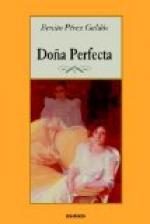=211= 28 =Ira=: ‘he must be going.’
=212= 4 =el pueblo se acaba=: ‘the town ends,’ i.e. we are coming to the last houses.
=212= 21 =bruto=: ‘an idiot.’
=213= 11 =quinque=: from the French manufacturer Quinquet, who first made such lamps on a considerable scale. The inventor was a Swiss chemist and physicist named Argant or Argand (1755-1803); hence these lamps are generally known in English as Argand lamps.
=213= 19 =acicalarse=: ‘prinking.’
=213= 25 =despejada=: ‘open.’
=214= 3 =allegados=: the Academy defines this word by =pariente= (’relative,’ the same word by which it defines =deudo=) and =parcial=; and it defines a colloquial figurative sense of =pariente= by “allegado, semejante o parecido.”
=215= 8 =un Limbo prematuro=: ‘a Limbo before the time.’ Cf. n. on p. 118, l. 17.
=215= 9 =cuidan bien=: this is normal Spanish for ‘take good care,’ declaratively. May it be a misprint of the Madrid edition for =cuiden bien=, to be interpreted ‘let them take good care’? In that case the order of words would be hardly the most usual; but it is not easy otherwise to reconcile the sentence with the general course of the thought in this passage.
=218= 15 =veros=: ‘to see each other.’
=220= =un su amigo=: ‘a friend of his.’
=220= 5 =virtuosisimo=: this word is used in the sense of the Italian virtuoso, a connoisseur, an appreciative and successful collector. The ending =-isimo= is here not merely intensive but very nearly true superlative; not ‘extremely’ but ‘supremely.’
=220= 6 =emblema=: ‘crest’; the word =creston= appears to mean not the heraldic device but the part of the helmet over which the device rises. =Emblema= is defined as meaning a symbol accompanied by a motto.
=220= 7 =rabillo=: this word must here mean a serif, but is probably not a technical term.
=222= 20 =le impondra a usted=: ‘will advise you.’
=224= 23 =nos=: ethical dative. R. 323; K. 231; C. 204.
=224= 26 =dude=: sc. =usted=, unless it is a misprint for =dudo=.
=224= 31 =San Baudilio de Llobregat=: a small town, commonly called San Boy, on the river Llobregat. It is six miles west of Barcelona. A large and well-administered private insane asylum is situated there.
=225= 5 =pliegos=: ‘sheets’ (sixteen pages each if the book is octavo).
=225= 25 =Albricias, albricias=: ‘joy, joy!’ (lit. a reward paid to the bringer of good tidings).
=226= 22 =acaparada=: ‘monopolized,’ ‘beguiled.’ This verb (from Fr. accaparer, to ‘corner’ a commodity in the market, to ‘seize upon’ a thing, to ‘sway’ voters by demagogic methods) was condemned as a Gallicism in the middle of the nineteenth century, but is now fully accepted in Spanish. It must not be confounded with the older but probably now less common verb =acaparrar=, whose meaning is entirely different.




